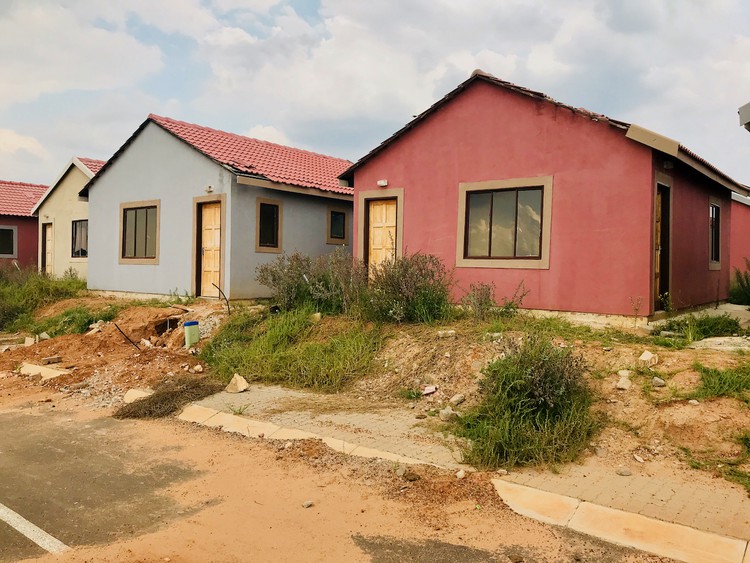500 families face eviction without alternative accommodation
High Court upholds eviction notice for Nigel RDP house occupiers
About 500 families who occupied these RDP houses in Mackenzieville, Nigel, now face eviction at any time by the City of Ekurhuleni. Archive photo: Kimberly Mutandiro
- About 500 families occupying Mackenzieville RDP houses in Nigel for four years face eviction at any time by the City of Ekurhuleni.
- This comes after the High Court upheld an eviction order from 2021 and denied the relief sought by the occupiers.
- The judge however suspended the eviction for a further month to allow the applicants to make a case for amending the order by appealing to the PIE Act.
- While the occupiers have lodged a case at the Supreme Court of Appeal, the eviction suspension period has passed.
- The occupiers say they will resist any attempt to evict them.
Occupiers of Nigel Mackenzieville extension 2 RDP housing project say they will once more put up a fight against their eviction. The 500 families were on 17 May served with a final notice of eviction by the City of Ekurhuleni to vacate the houses by 1 June.
The eviction comes about three months after they were first evicted and dumped on the street on 28 February. But that eviction was done without the Sheriff and without proper notice, and the City had to reinstate the occupiers the same day by order of Judge Stuart Wilson in the Johannesburg High Court.
The occupiers are mostly backyard dwellers from Alra Park who occupied the RDP houses four years ago after contractors abandoned the housing project. The occupation sparked racial tensions between the coloured occupants and black Snake Park informal settlement residents who are the legal beneficiaries of the housing project.
The original eviction was granted by Judge Molahleni in June 2021, ordering the occupiers to vacate the houses by 9 July 2021. Leave to appeal the eviction was dismissed in December 2021 but the City, for unstated reasons, then took over a year to execute the order.
Following the 28 February eviction, advocate Desmond Brown of Billings Attorneys, obtained a stay of eviction. The lawyers argued that the occupiers must be offered alternative accommodation before they can be evicted.
But on 4 April, Judge Wilson concluded that the application did not succeed.
“The problem is that the residents can show no such right … Molahlehi J made an order [June 2021] evicting the residents. The judge chose not to direct that the residents be given alternative accommodation. It appears from his judgment that he considered that this would encourage the unlawful occupation of other properties in similar circumstances, and that this would imperil the rule of law.”
“It is not open to me to revisit that issue. But that is precisely what the residents now invite me to do.”
“It was suggested in reply that it is open to me to develop common law to allow for the variation of an eviction order to provide alternative accommodation where another judge had declined to do so.
“This would be far reaching development for which no justification other than that it would assist the residents has been provided,” said Judge Wilson.
He said no case had been made out to vary the eviction order under the PIE Act, which was one remedy open to the applicants. But they had not done so.
However, the judge suspended the eviction until 5 May to give the applicants time to consider making out a case under the PIE Act in the interests of justice.
Furthermore, the judge added conditions “necessary to avoid a repeat of the wholly unacceptable conduct of the municipality”, and he said “the pre-dawn commencement of the eviction on 28 February 2023 was also inhumane”.
He ordered that the occupiers be given at least two-weeks notice before an eviction, and that an eviction order may not be executed before 8am or after 4pm.
The City of Ekurhuleni has respected these time frames in serving its latest eviction notice.
Meanwhile Brown has filed a petition in the Supreme Court of Appeal by appealing to the PIE Act.
“We believe that the constitutional rights of the people should be maintained and that they should be provided alternative accommodation. As long as such provision is not provided for, it goes without saying that such an eviction cannot be possible. Hence we have filed a petition in the Supreme Court of Appeal to allow for consideration of such provision,” said Brown.
Zill Rittles, of the Greater Nigel People’s Parliament, which led the occupation, said, “There will be resistance from the community. The occupation was originally dominated by coloureds in our communities who were marginalised from getting houses.”
In an added twist, some of the original occupiers have sold houses to black families.
“It is unfortunate that black people from other communities who bought the houses are now faced with the challenge of fighting the eviction because they spent a lot of money on the houses,” said Rittles.
Support independent journalism
Donate using Payfast

Don't miss out on the latest news
We respect your privacy, and promise we won't spam you.
Next: Over 200 Khayelitsha families refuse to relocate for private hospital
Previous: Ficksburg community leaders arrested during clashes over land occupation
© 2023 GroundUp. This article is licensed under a Creative Commons Attribution-NoDerivatives 4.0 International License.
You may republish this article, so long as you credit the authors and GroundUp, and do not change the text. Please include a link back to the original article.
We put an invisible pixel in the article so that we can count traffic to republishers. All analytics tools are solely on our servers. We do not give our logs to any third party. Logs are deleted after two weeks. We do not use any IP address identifying information except to count regional traffic. We are solely interested in counting hits, not tracking users. If you republish, please do not delete the invisible pixel.

